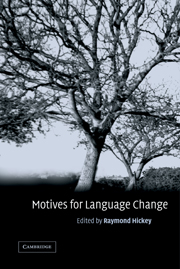Book contents
- Frontmatter
- Contents
- Notes on the contributors
- Acknowledgements
- Introduction
- Part I The phenomenon of language change
- Part II Linguistic models and language change
- Part III Grammaticalisation
- 7 Grammaticalisation: cause or effect?
- 8 From subjectification to intersubjectification
- Part IV The social context for language change
- Part V Contact-based explanations
- Part VI The typological perspective
- Index
- References
7 - Grammaticalisation: cause or effect?
Published online by Cambridge University Press: 22 September 2009
- Frontmatter
- Contents
- Notes on the contributors
- Acknowledgements
- Introduction
- Part I The phenomenon of language change
- Part II Linguistic models and language change
- Part III Grammaticalisation
- 7 Grammaticalisation: cause or effect?
- 8 From subjectification to intersubjectification
- Part IV The social context for language change
- Part V Contact-based explanations
- Part VI The typological perspective
- Index
- References
Summary
A nineteenth-century legacy
The central research question for nineteenth-century linguists was: how did a language get to be the way it is? Historical linguistics was the only kind of linguistics of the time. Towards the end of the century, Hermann Paul (1880: 20) was able to pontificate that ‘Es ist eingewendet, dass es noch eine andere wissenschaftliche Betrachtung der Sprache gäbe, als die geschichtliche. Ich muss das in Abrede stellen’ (It has been objected that there is another scientific view of language possible besides the historical. I must contradict this). What changed for the nineteenth-century linguists was a language and a language essentially was an inventory of words. There was more to it than that, of course, but everything else was attributable to either a universal ‘logic’ or individually variable ‘habits’, and this didn't interest contemporary linguists much. So there wasn't anything to have a history of except words, their pronunciations and their meanings.
Words are transmitted from one generation to the next and they may change their form in that transmission. Latin pater ‘father’ became padre, père, patre, pai, etc. in the modern Romance languages. One could characterise such changes by writing sound ‘laws’, for example, that a dental stop is voiced in some phonetic environment, between a vowel and a vocalic r in Italian and Spanish, C –> +vd/V_ṛ.
In this view, languages are the basic objects of reality, entities ‘out there’, existing in their own right, waiting to be acquired by speakers, essentially inventories of words.
Information
- Type
- Chapter
- Information
- Motives for Language Change , pp. 99 - 123Publisher: Cambridge University PressPrint publication year: 2003
References
Accessibility standard: Unknown
Why this information is here
This section outlines the accessibility features of this content - including support for screen readers, full keyboard navigation and high-contrast display options. This may not be relevant for you.Accessibility Information
- 1
- Cited by
